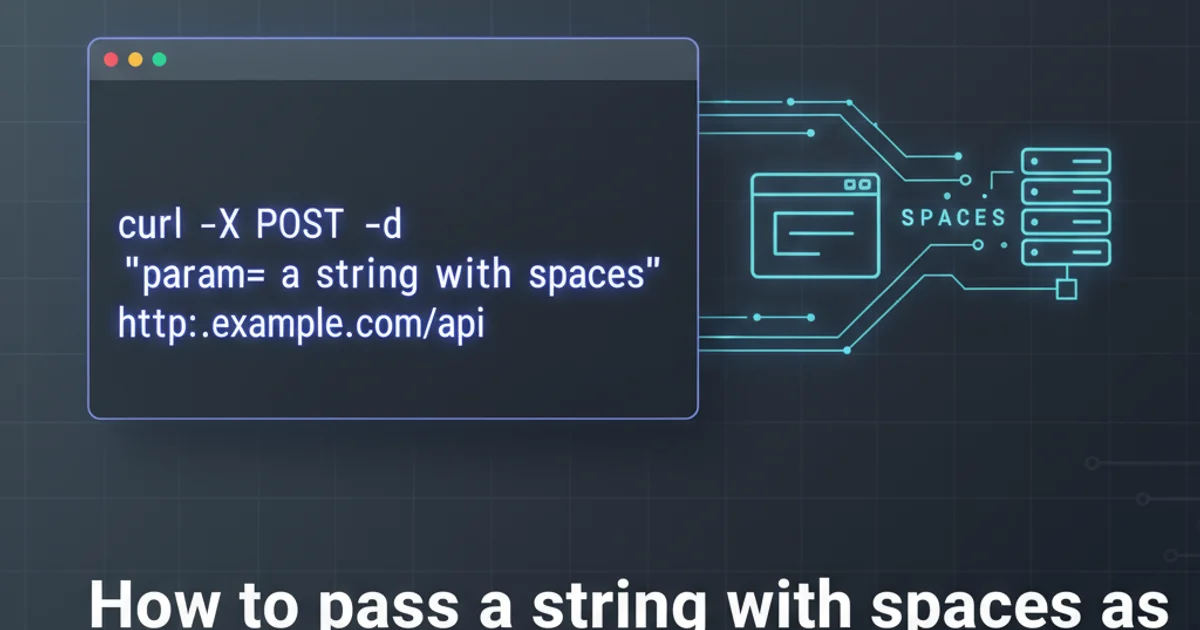How to pass a string with spaces as http POST data using curl
Categories:
Mastering cURL: Sending POST Data with Spaces

Learn how to correctly send HTTP POST data containing spaces using cURL, covering common pitfalls and best practices for various scenarios.
When working with HTTP POST requests, especially from the command line using curl, you'll often encounter situations where your data contains spaces. Incorrectly handling these spaces can lead to truncated data, parsing errors on the server side, or unexpected behavior. This article will guide you through the proper techniques to ensure your data, including spaces, is transmitted accurately.
The Challenge of Spaces in Command-Line Arguments
The primary challenge arises because the shell (like Bash) interprets spaces as delimiters between arguments. If you pass a string with spaces directly to curl without proper quoting, the shell will break it into multiple arguments, and curl will only receive the first word, or misinterpret subsequent words as other options. This is a fundamental aspect of how command-line interfaces process input.
flowchart TD
A[User types curl command] --> B{Shell parses command}
B --> C{Are spaces quoted?}
C -->|No| D[Shell splits arguments at spaces]
D --> E[curl receives truncated/malformed data]
C -->|Yes| F[Shell treats quoted string as single argument]
F --> G[curl receives full data with spaces]
G --> H[Server processes data]Flowchart illustrating shell's handling of spaces in cURL commands.
Basic Quoting for Simple Strings
The most straightforward way to handle spaces in your POST data is to enclose the entire data string in single or double quotes. This tells the shell to treat the quoted content as a single argument, preserving the spaces within it.
curl -X POST -d 'my_param=This string has spaces' http://example.com/api/data
Using single quotes to send a string with spaces.
curl -X POST -d "another_param=This string also has spaces" http://example.com/api/data
Using double quotes for a string with spaces.
') when your string does not contain variables or special characters that need shell expansion. Use double quotes (") if you need shell variables (e.g., $VAR) to be expanded within the string, but be mindful of escaping internal double quotes or other special characters.URL Encoding for Robustness
While quoting handles shell interpretation, HTTP POST data, especially when sent as application/x-www-form-urlencoded, often requires spaces to be URL-encoded as + or %20. curl can handle this automatically if you use the --data-urlencode (or -G with -d) option. This is generally the most robust method for sending form data.
curl -X POST --data-urlencode 'message=Hello World from cURL' http://example.com/submit
Using --data-urlencode to automatically encode spaces.
The --data-urlencode option is particularly useful because it not only encodes spaces but also other characters that might have special meaning in a URL query string (like &, =, /, etc.), ensuring your data is transmitted correctly and safely.
Sending JSON Data with Spaces
When sending JSON payloads, the data format itself handles spaces within string values. The challenge here is ensuring the JSON string is correctly quoted for the shell and that curl sends the correct Content-Type header.
curl -X POST \
-H "Content-Type: application/json" \
-d '{"name": "John Doe", "message": "This is a test message with spaces."}' \
http://example.com/api/json
Sending JSON data with spaces using single quotes.
-d @filename.json.Perl and Bash Scripting Examples
When integrating curl into scripts, the same quoting rules apply. Here are examples for Bash and Perl, demonstrating how to construct commands with data containing spaces.
Bash Script
#!/bin/bash
DATA_WITH_SPACES="My important data with multiple words"
Using single quotes for the -d option
curl -X POST -d "param1=$DATA_WITH_SPACES" http://example.com/script_endpoint
Using --data-urlencode for robustness
curl -X POST --data-urlencode "param2=$DATA_WITH_SPACES" http://example.com/script_endpoint
Perl Script
#!/usr/bin/perl use strict; use warnings;
my $data_with_spaces = "My important data with multiple words";
Using system call with properly quoted arguments
system("curl", "-X", "POST", "-d", "param1=$data_with_spaces", "http://example.com/perl_endpoint");
Using backticks for simple execution (less robust for complex args)
my $response = curl -X POST --data-urlencode 'param2=$data_with_spaces' http://example.com/perl_endpoint;
print "Response: $response\n";